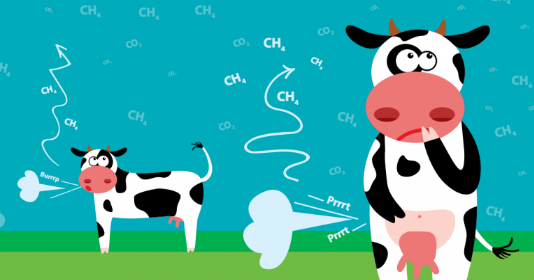Are Cows Bad for the Environment?

December 6, 2019
Recent research and study has shown that cow flatulence is contributing to climate change, and although the good news is that cow farts aren’t hurting the environment, their burps are.
The Washington Post tells us that cows are ruminants, which means that the microbes in their stomachs helps them digest food by fermenting all the food they eat. Even though the process is to help them digest food, their way of going about doing this produces a powerful greenhouse gas, methane, which gets released into the atmosphere when they burp.
In fact, the agriculture part of our society is one of the biggest sources of climate altering gases, in which comes from meat and dairy production. “If cows were their own country, they would be the third-biggest greenhouse gas emitter in the world.”
So the big question is, are cows bad for the environment? In a way, yes, because they are contributing to the amount of greenhouse gases. Some may say that cows are good for the environment because they provide us humans with something to eat and could make good pets, but in the long run, the even bigger question is, should we stop eating meat?
The Washington Post shows us that, “because of population increase and changes in diets as the global middle class grows, agriculture’s emissions have been rising steadily. By 2050, when the world’s population is projected to hit 10 billion, scientists anticipate it will use up most of humanity;s annual carbon budget… just to feed everyone.”
As you can clearly see, the consumption and creation of animals that we use for eating, specifically cows have contributed to the rise of greenhouse gases to the point of being unable to save our beloved planet Earth.






